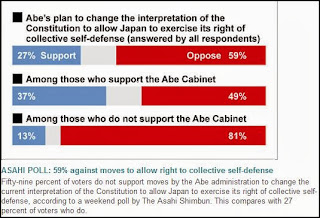It’s probably better to overestimate the threat of conflict
in international affairs than to underestimate it. But it’s certainly better to dispense with
alarmist assessments if you can make more accurate ones.
Ask anyone who follows international affairs where the
hotspots in Asia are right now and that person will be quite likely to bring up
the Senkaku/Diaoyu islands dispute between China and Japan. We heard an informative presentation by Mr.
Daniel Hartnett at last weekend’s fall conference on the matter in which it was
predicted as being “likely” that a skirmish will occur between
China and Japan and potentially lead to war.
National pride and the desire to exploit possible sea floor oil deposits
have caused tensions to rise over the last few year and most informed people
see a tipping point looming on the horizon. But consider the incentives all
nations involved have to avoid war and it’s rather obvious that violence isn't
even close to likely.
Distorted assessments like these are often created by a lack of
important information about the capabilities and interests of the parties to a
dispute. The Team B Report from 1976,
for example, took advantage of American ignorance of the USSR. With a dearth of reliable information, its
assessment was driven by ideological goals emphasizing the possibilities for
conflict instead of its probability.
But in the East China Sea we have a tremendous amount of
information to give context to our assessments.
The values of the three main parties to the dispute – China, Japan, and
the U.S. – are well understood and we can see them choosing to behave rationally
to avoid conflict.
Undoubtedly, there are plenty of people in China who would love
to go to war with Japan – riots occurred in Chinese cities after Japan
purchased the islands from one of its citizens and nationalist Japanese sojourned
to the Senkakus to wave the Rising Sun.
But in China, the government runs the show no
matter what – what regular people think doesn't matter in the formulation of
foreign policy. After initially seeming to encourage the protests, Beijing put
the clamp down to calm tensions. This
has been in keeping with the recent trend in Chinese foreign policy to stop
trying to scare the wits out of its neighbors through saber rattling and
instead grow its soft power in the region and throughout the world.
Conversely, Japan is a democratic society that is staunchly anti-military. If shots are fired, it won’t be Japan who
does it first, as it is forbidden from initiating aggression by Article 9 of
its constitution. There have always been
nationalist elements who would like to reinterpret Article 9, but they remain a
minority according to an August, 2013 poll by the Asahi Shimbun:
The U.S. itself has every incentive to prevent violence
breaking out, as it is obligated by security treaty to come to Japan’s defense. And, of course, Japan and China are two of
the United States’ largest trading partners.
In today’s liberal international framework, nations no
longer view war as the best path to economic riches and political power. Particularly for Japan and China, no matter
how deep the historical enmity, one huge factor will maintain peace: economic
interdependence.
To quote the New York Times at length on the issue:
According
to Japan’s Finance Ministry, China was Japan’s largest trading partner last
year, and Japan is China’s second-biggest trading partner after the United
States. Japan is also China’s largest outside investor, with Japanese companies
directly or indirectly employing about 10 million Chinese, according to a
Japanese lobby group.
Perhaps
as important as the volume of the trade and investment, though, is how
complementary the two countries’ industries are.
Japan’s
still formidable lead in technology allows it to provide much of the production
machinery in Chinese factories and many of the core components in Chinese-made
products that have helped make China’s rise possible. Japan’s struggling
electronics companies, in turn, have become dependent on sales to China’s
lower-cost manufacturers, which use Japanese memory chips, display panels and
other parts in many of their high-tech products.
Both nations want to exploit any oil-deposits around the
Senkakus for economic gain, but realize that war to achieve that goal would
first result in economic suicide. Japan
is an established liberal democracy and China’s political development seems to
have matured enough to recognize such costs of war and benefits of peace. As Mr. Hartnett posited, if tensions turn to
violence it would most likely not start from official command, but from a
Japanese or Chinese captain carried away by patriotic fervor. So the question is really how committed and
able the Chinese and Japanese governments are to preventing hot headedness.
Of course, it’s difficult to know how strictly enforced the
engagement policies of the respective governing entities are with any
specificity. But my take is that these two politically mature governments
recognize the costs of a skirmish and know that providing clear directives to
their respective maritime forces is of utmost importance.
So when the incentives of all three parties are taken into consideration it’s obvious that predictions of war really are alarmist. What’s most likely is that China and Japan will cool tensions and shelve the Senkaku issue to focus on those that are of much greater importance to their economic securities. And if things really do start to grow out of control, the U.S. will use its hegemonic influence to press for an internationally mediated resolution where both sides can find victories to claim. All involved are smart enough to see that their larger interests are better served by negotiation than war.


No comments:
Post a Comment